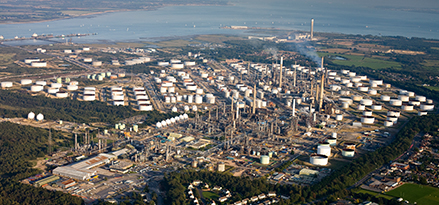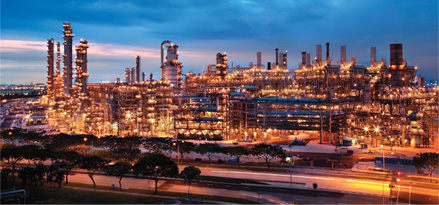Discover our products
We believe that supply reliability is about offering our customers peace of mind, product availability, integrity and a commitment to the highest standards of business operations.
Through Fawley refinery, and our robust network of pipelines and terminals, we strive to supply our customers with the fuels they need, where they need them.


Additised Diesel delivers both a cleaner engine and lower emissions, contributing to an impressive overall performance for your engine and your business.
Learn more by contacting your Esso wholesale fuels sales representative, emailing us at dieselefficientuk@exxonmobil.com or contacting an authorised distributor of Esso Diesel Efficient™. Safety Data Sheet for Diesel. Find out more




On the road to lower greenhouse gas (GHG) emissions
At ExxonMobil, we develop and deploy energy solutions that meet society's needs. Today, that means providing products that support the energy transition, reducing our own carbon emissions and developing technologies to advance a lower carbon emissions future.
Hydrogen and biofuels will play an important role in helping achieve the transition to a lower-emission future. We will leverage our expertise in technology and scale to help meet the industry's demand. Follow this link which outlines our position on road transport's path to reducing GHG emissions.

Biofuels
There are two types of alternative diesel products: biodiesel and renewable diesel. Both biodiesel and renewable diesel are primarily sourced from vegetable oils and animal fats. ExxonMobil is making considerable investments in biofuels production and technology and sees it as a solution that can:
- Meet the needs of current vehicle fleets
- Require little to no incremental customer investments
- Deliver an affordable alternative
- Provide high levels of lifecycle GHG emission reductions

Hydrogen
ExxonMobil views hydrogen and its derivatives as a viable solution for hard-to-decarbonise transport sectors, including HD road transportation.
Hydrogen combined with carbon capture and storage provides potential advantages versus current alternatives:
- Substantial supply once infrastructure is scaled and supportive policy is in place
- High GHG emission reduction potential (green, blue hydrogen) and zero carbon tailpipe emission
- Faster refueling and lightweight relative to EV (particularly for Heavy Duty vehicles) potentially increasing productivity and payload capacity.
FAQs
Esso™ Diesel Efficient is an advanced diesel fuel formulated to help clean up your heavy-duty diesel engines. Find out more about Diesel Efficient
- Independent tests performed at Millbrook Proving Ground Ltd., UK:
- Compared the performance in heavy-duty vehicles of Esso™ unadditised diesel with Esso Diesel Efficient™ fuel
- Used third-party customer trucks (Euro III and Euro V specifications)
- Covered approximately 110,000 miles/177,000 km
- Five months of normal daily on-road operations (motorway, rural, and urban environments)
- Took trucks out of service periodically for lab testing
-
Test results range of 2.1% to 3.4% lower fuel consumption
Millbrook has expertise in automotive, test, and propulsion technologies and remain pioneers in low carbon development. (ISO Certification - ISO 17025, ISO 9001 and ISO 14001.)
Esso Diesel Efficient™ fuel claims are based on internal and third-party vehicle engine testing, laboratory testing, and/or industry or other scientific literature. Basis for comparison for all claims is versus Esso™ unadditised diesel. Vehicle type, engine type, driving behaviour, and other factors also impact fuel and vehicle performance, emissions, and fuel economy. Esso Diesel Efficient™ fuel may be used in all heavy-duty and light-duty vehicles, but results may vary. Fuel economy testing was performed in the UK using on-road trucks."
HVO is an abbreviation for hydro-treated vegetable oil which is made by hydro-treating vegetable and animal oils and fats. HVO may also be referred to as renewable diesel and may be blended with traditional diesel. Unlike FAME, HVO does not contain oxygen and can be used as a standalone fuel in diesel vehicles if approved by the vehicle manufacturer(1).
1Vehicle manufacturer fuel requirements should be checked when considering the use of 100% HVO.
We use the methodology outlined in the amended Renewable Transport Fuel Obligations Order 2007 (SI 2007/3072) as amended (“RTFO”), which includes contributions from N2O and CH4, expressed in CO2 equivalents (CO2e). The life cycle GHG saving from biofuels and bio liquids (e.g. HVO) is calculated by comparing the carbon intensity of the HVO fuel with a fossil fuel comparator, using RTFO default values for the renewable and fossil fuel comparators. In this case, the expected life cycle GHG emission saving of 15.2% for Esso HVO25 containing 25% HVO was calculated against the equivalent figure for regular diesel containing up to 7% fatty acid methyl ester (FAME).
GHG saving of biofuels & bio liquids = (E(F) – E(B) )/E(F)
E(F) = total emissions from the fossil fuel comparator
E(B) = total emissions from the biofuel or bio liquid
E(B) = E(HVO)

Get more out of your Esso Card™
Find out more by discovering…
-

About
Discover who we are and who we do business with.
-

Terminal locator
Explore our terminal network and find the nearest terminal to you.
-

Contact us
Reach out to us and our team of experts will work with you to find a wholesale fuels solution.
Explore our other websites
(1)Comparison is versus regular Esso Synergy Diesel. Esso HVO25 contains a minimum of 25% renewable diesel. Choosing Esso HVO25 instead of Esso Synergy Diesel (B7) can result in 15% lower lifecycle greenhouse gas (GHG) emissions. Fuels vary both in their total life cycle emissions (i.e. from production to use or “well to wheel”) and in how the emissions are distributed throughout that life cycle. The methodology for calculating life cycle emissions and emissions reductions follow that outlined in the Renewable Transport Fuel Obligations Order 2007 (SI 2007/3072) as amended (“RTFO”). For more details about the product and full details of the calculation including assumptions and emission factors visit FAQ below. ESSO and the Esso Logo are trademarks of ExxonMobil Corporation or one of its subsidiaries.



